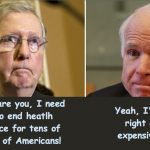health care
Umair Shah’s story isn’t an uncommon one in public health. Starting out in medicine, with a career as an emergency department doctor, he said it quickly became clear that most of what impacts our health happens outside the hospital and in the community.
Today, that philosophy drives his work as executive director of Harris County Public Health (HCPH) in Houston, Texas — an agency that serves the third-largest county in the nation, home to about 4.5 million residents. In fact, Shah, who first joined the agency in 2004 and become director in 2013, said the agency’s mantra is this: “Health…
John McCain has a good heath care plan, and if has his way, you won't.
The Senator most often accredited for thinking for himself (that's a lie) will vote with Russian agent Donald Trump and the rest of the Republicans to take away Obama care. The moment he gets a chance.
However, he can't right now because he is indisposed, recovering form surgery.
We at Greg Laden's Blog wish Senator McCain a speedy recovery and hope he is well. But we also urge him to think about his privilege and not take access to the sort of health care he has from other Americans.
Speaking of the Russians, The Looking…
If you’re pregnant and live in Cleveland, Ohio, it’s likely you’ll pay about $522 for an ultrasound. If you live about 60 miles south in Canton, Ohio, it costs about $183 for the same procedure, a recent study found. Why such a significant price difference? Researchers couldn’t single out one overriding factor. But the study does tell us this: place matters when it comes to how much you pay for health care.
The study was published last week in Health Affairs and was based on data from the Health Care Cost Institute, a commercial claims database that includes nearly 3 billion paid claim lines…
As the U.S. seeks to drive down medical spending, one goal is to eliminate tests and treatments that are ineffective while encouraging price competition among things that work. Passing the buck on to the consumer isn't enough; on The Pump Handle, Liz Borkowski reports that giving patients an incentive to save money on health care causes them to see the doctor less, not "shop smarter." Meanwhile, Orac provides an update on "Choosing Wisely," a program meant to weed out useless procedures by appealing to the prudence of medical specialists instead of patients. In the three years that it has…
Childhood lead poisoning is one of those health risks that everyone has likely heard about, but many probably think it’s a problem of the past. However, a recent study reminds us that in just one state — Michigan — the effects of childhood lead poisoning cost about $330 million every year. And that’s a conservative estimate.
But estimating the cost of childhood lead poisoning wasn’t the only goal of the study, which was released earlier this week. Study author Tracy Swinburn, a research specialist at the University of Michigan Risk Science Center, wanted to know what kind of financial return…
And the best article on the implications of this, surprisingly, comes from Huffington post authors Young and Kirkham:
The database released on Wednesday by the federal Centers for Medicare and Medicaid Services lays out for the first time and in voluminous detail how much the vast majority of American hospitals charge for the 100 most common inpatient procedures billed to Medicare. The database -- which covers claims filed within fiscal year 2011 -- spans 163,065 individual charges recorded at 3,337 hospitals located in 306 metropolitan areas.
...
Within the nation’s largest metropolitan area…
Crazy ranting about impending socialism/fascism aside, there are legitimate critiques to be made of Obamacare. One policy in particular that raises my ire is penalizing hospitals over performance metrics and penalizing readmissions in particular. The way it works is, patients are admitted to the hospital, treated, and eventually discharged, but a indicator of failure of adequate care is if that patient then bounces back, and is readmitted shortly after their hospitalization:
Under the new federal regulations, hospitals face hefty penalties for readmitting patients they have already treated…
For those disturbed by the evils of the hospital chargemaster as exposed by Brill's piece in time, Uwe E. Reinhardt's proposed solution is a must read.
While the hospitals are never going to charge the uninsured the same rate as they charge medicare (and probably be less forgiving the more they think they can get out of you), that's no reason we can't force them to with state law. Apparently that's what Reinhardt had them do in Jersey:
In the fall of 2007, Gov. Jon Corzine of New Jersey appointed me as chairman of his New Jersey Commission on Rationalizing Health Care Resources. On a ride…
Steven Brill's extensive piece in Time has generated a good discussion once again on why Americans pay so much more for health care than other countries, and while I agree with most of his critiques, he seems to have gotten overly hung-up on the hospital chargemaster.
Readers of this blog know I've also discussed reform in health care, the diverse sources of excess cost including price gouging on pharmaceuticals, defensive medicine, expensive end-of-life care, the high cost of primary care in the ER etc, and both Brill and I appear to have relied on the same sources of data in the McKinsey…
by Kim Krisberg
This is the first in a series exploring the intersections between effectively caring for people living with chronic pain and the rise in unintentional poisoning deaths due to prescription painkillers. The series will explore the science and policy of balancing the need for treatment as well as the need to prevent abuse and diversion. This week's story provides a look at the field of pain medicine and the patients it cares for; next week's story will look at the educational and risk reduction approaches physicians are employing to address opioid addiction and overdose.
It took…
On Respectful Insolence, Orac writes “the relationship between health insurance and, well, health is a question that can be addressed scientifically, which puts it right smack dab within the purview of science-based medicine.” Orac contradicts Mitt Romney’s statement that because a 1986 mandate requires hospitals to treat anyone needing emergency treatment, people don’t die for want of insurance. Orac writes, “Emergency rooms are not equipped to treat complex conditions; all they can do is to treat the acute problem.” And forced to eat expenses, private hospitals are liable to treat any…
It seems every day brings a new, glaring falsehood about medical care from Romney, who has bizarrely decided to run against his own healthcare plan in order to appease right wing voters. Now he's claiming Americans don't die from lack of healthcare coverage. His reasoning? The unfunded mandate and healthcare-of-last resort stopgap that is EMTALA. For those of you who don't know the function of the Emergency Medical Treatment and Active Labor Act, it's law passed in the Reagan era to stop hospitals from dumping patients who were acutely ill and needed emergency care. It prevents hospitals…
This article from the Sunday Times by AEI fellow J.D. Kleinke is exceptional for two reasons. For one, it's an excellent explanation for why conservatives should agree with Obamacare. Second, despite coming from the American Enterprise Institute, an organization that regularly contributes global warming and other conspiratorial nonsense to the WSJ editorial page, it appears to contain nothing but factual information. It's a good reminder of why liberals have been weak in their defense of the law - it's really just Federal Romney/Bob Dole care, but also provides a very striking critique of…
First, if you don't have health insurance, that's OK. Just wait until you are catastrophically ill and then they'll pick you up in an ambulance and bring you to an emergency room. He does not discuss what happens later when they come to collect the payments. Also, according to Romney, an Obamacare like plan was a great way to manage health insurance for Massachusetts at the time he was governor, but this does not apply to other people.
Chief Justice John Roberts proved himself an independent thinker last month, siding against his fellow conservatives (and Republican appointees) in upholding the Affordable Care Act of 2010. Roberts agreed that Congress could not force a citizen to buy insurance, but allowed the individual mandate to survive as a tax. In the meantime, the ruling placed limits on federal power to expand Medicaid, leaving 16 million people in the lurch. Liz Borkowski says “the Supreme Court’s decision clouds what should have been a clear distribution of the most beneficial impacts to the most needy.” Kim…
Atul Gawande, thoughtful as always, writes about the "wicked problem" of healthcare reform and the historical similarity between this battle and previous battles to expand fairness to all of our citizens. Opening with the kind of experiences all physicians have had with tragically-uninsured patients, he emphasizes why this was a needed change:
A few days ago, while awaiting the Supreme Court ruling on the Obama health-care law, I called a few doctor friends around the country. I asked them if they could tell me about current patients whose health had been affected by a lack of insurance.
“…
It's good news that the Supreme Court split 5-4 with Roberts (and not Kennedy?!?) as the deciding vote, to uphold the affordable care act. It's interesting that this was controversial, and certainly Roberts led the court to a very safe middle ground making the issue about taxation and saying the commerce clause could not apply. If anything, I wonder if this weakens the previous commerce powers of Congress as defined by Wickard v. Filburn, I'd love to hear what a lawyer thinks.
What does this mean?
Well in the short term not a whole lot, this healthcare bill requires a very slow roll-out…
Cause and effect weave a tangled web, but a new data analysis tool called MIC can help make sense of it all. The Weizmann Institute writes that "Large data sets with thousands of variables are increasingly common in fields as diverse as genomics, physics, political science, economics and more." Evaluating pairs of variables from among the thousands, MIC assigns each a score based on the strength of the relation between its variables. For example, while combing through an incredibly complex dataset from the World Health Organization, MIC observed that "obesity increases…
Hunter_de_Rat
Scientists funded by the People for the Ethical Treatment of Animals (PETA) organization are reportedly guiding Chinese officials towards their "very first non-animal test method for cosmetics ingredients." Given that PETA is an organization not known for either ethics or science, I am deeply skeptical about whether this initiative, if true, would promote biomedical research.
From their press release:
PETA Grant Enables Scientists to Guide Chinese Officials in Non-Animal Test Use
Norfolk, Va. -- Chinese officials are in the final stages of approving the use of the country's…
Yes, thirty days of McDonald's meals causes weight gain, even heart palpitations. But what happens to your arteries?
For the first time, a short term, six week, study (using mice) shows that a similar diet causes arteries to begin clogging, and worse, affects its structural and mechanical properties. This study used a high fat diet comprised of about 36% of calories as fat; a Big Mac has about 49%.
From the study:
The arterial compliance was compared between control and high fat-fed mice for 6 weeks.We show that the compliance of the TDAs was dramatically reduced in high fat-fed mice…


